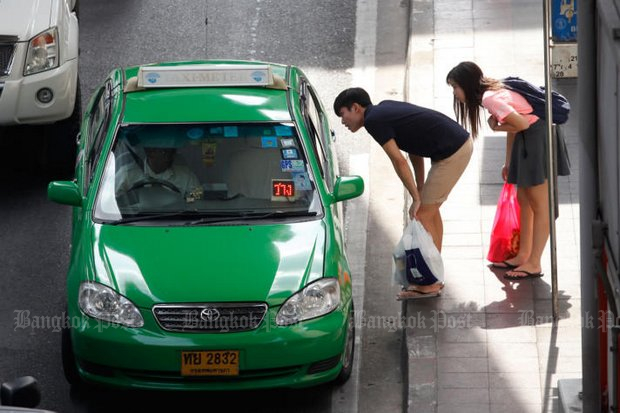
The Thailand Development Research Institute (TDRI) has suggested a new 50-satang-per-minute taxi fare hike to increase the income of drivers and reduce the likelihood of them refusing passengers.
The idea was floated during a gathering Thursday of representatives from taxi driver associations and the Department of Land Transport (DLT).
The DLT commissioned the TDRI to conduct research on improving the quality of public taxi services and how ride-sharing applications such as Grab can operate legally.
The study results are set to be presented by next month.
The institute's Transportation and Logistics Policy research director, Sumet Ongkittikul, said fare hikes would be a key factor in improving taxi service quality.
But he said the fixed starting fare of 35 baht for the first kilometre would not have to change.
"Taxi drivers generally refuse passengers because they don't want to get stuck in traffic when their time could be better spent earning more money elsewhere," he said.
"Our research suggests that introducing a new system where passengers are charged for the amount of minutes they are actually in the cab will act as an incentive for drivers [to accept passengers]."
According to Mr Sumet, this would involve passengers being charged 50 satang per minute throughout their journey.
At present, DLT rates for taxis caught in traffic are 2 baht per km for vehicles travelling at less than 6km per hour.
"While there are several congested areas in the capital, drivers would still opt for areas with less traffic, since there is no guarantee that they will be driving at 6km per hour [for at least 1km at a time]," Mr Sumet said.
He said the average Bangkok taxi driver earns 300-400 baht a day, roughly the minimum wage.
The TDRI report says drivers pull in 1,400 baht a day on average but those who rent their cars must spend upwards of 1,000 baht on daily rental fees and fuel.
Mr Sumet said the proposed surcharge would bring their daily revenue to 1,600 baht.
He also suggested a new demerit system for taxi drivers to replace the current DLT-affiliated penalty system of fining those who engage in misconduct.
"At present, the policy has been ineffective because drivers just get fined and then are back behind the wheel," he said.
"What we propose is a system where authorities keep track of past cases, which could be used to suspend or revoke a driver's licence."
According to Mr Sumet, the system will model itself on Singapore.
The island state's Vocational Licence Points System, introduced in 2003, states that a taxi driver who accumulates between six and 20 demerit points in a year could have their licence suspended.
Demerits will be cleared if they maintain a clean record for a year from the date of the last offence.
Meanwhile, DLT deputy chief Jongrak Kitsamrankhun has urged ride-sharing firm Grab to reach an agreement with the department to legally register as a transport company and pay taxes.